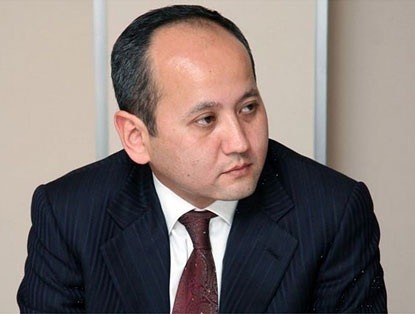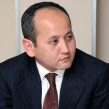
Ablyazov Sentenced to Prison in UK for Contempt of Court
Publication: Eurasia Daily Monitor Volume: 9 Issue: 40
By:

The fugitive Kazakh banker Mukhtar Ablyazov, accused of embezzling $5 billion from Kazakhstan’s BTA bank, was sentenced on February 16 to 22 months in prison for failing to disclose his assets and lying under oath to the High Court of England and Wales. Justice Nigel Teare concluded that Ablyazov had breached a court-ordered freeze on his assets, presented “untrue” evidence about property ownership and provided evidence “with the intention of interfering with or impeding the course of justice.” The Justice qualified Ablyazov’s breaches as “deliberate” and “substantial,” describing his conduct as “brazen.” The court has issued arrest warrants, but lawyers of BTA bank believe that Ablyazov, who failed to appear at the hearing in London, may have already fled England (Financial Times, The Guardian, Press Association, February 16).
The current management of BTA brought the contempt of court case against the former bank chairman Ablyazov in May 2011 to prevent him from dispersing or transferring his assets, which the court had put under KPMG receivership in 2010. The hearing was only one part of the legal proceedings on nine separate fraud charges launched by BTA against Ablyazov, who absconded to Britain after the bank collapsed in 2009. The trial has been unprecedented in the English courts, involving more than 100 court hearings in front of five judges, engaging more than 50 leading lawyers, including 22 partners and 32 barristers (The Lawyer, February 6).
A former Minister of Energy, Industry and Trade in Kazakhstan in 1998-99, Ablyazov has maintained that he is a victim of repression and persecution as a political opponent of President Nursultan Nazarbayev, whose power he challenged by establishing the opposition party Democratic Choice of Kazakhstan in 2001. He was convicted for illegal business activities as well as abuse of power as a government minister and sentenced to six years in prison in 2002, but released ten months later after writing a plea to the President and using the support of influential friends.
Ablyazov was chairman of the board of directors of BTA bank, the largest lender in Kazakhstan, from 2005 to 2009. At the beginning of 2009, when the bank became insolvent, with debts amounting to $12 billion, the Kazakh government transferred its management to the national sovereign wealth fund Samruk-Kazyna. Among the financial institutions affected by the downfall of BTA were Barclays, Standard Chartered, Royal Bank of Scotland, HSBC, JPMorgan, Merrill Lynch and Morgan Stanley. Kazakhstan’s government bailed out the troubled bank as it did several other banks affected by the financial crunch. The new bank management, however, soon discovered that BTA’s assets had been siphoned through an elaborate scheme of fake loans to bogus companies owned by Ablyazov. As a criminal case was launched against Ablyazov, he fled to England together with Zhaksylyk Zharimbetov, the former first deputy chair of the bank’s managing board, and Roman Solodchenko, the chair of the managing board. (Interfax News Agency, April 27, 2010).
In January 2011, Kazakhstan’s Prosecutor General’s Office sent an official request for the arrest and extradition of the former chief of BTA bank charged with large-scale fraud and embezzlement. Instead, the UK Home Office granted Ablyazov political asylum in July 2011, a decision that caused tensions between London and Astana.
The massive embezzlement at BTA Bank has resulted in criminal charges against former BTA managers in several CIS countries including Kazakhstan, Russia, Ukraine and Kyrgyzstan (Interfax News Agency, February 20). In October 2010, a Moscow court issued a warrant for the arrest of Ablyazov for exceptionally large fraud. Four managers of his company Eurasia Logistics were arrested in Moscow in March 2010 and charged with the embezzlement of $2 billion in Kazakh investments (Global Insight, March 19, 2010). Pressed by snowballing legal problems, Ablyazov complained to his lawyer about England’s judicial system. He was quoted as saying “the English seem to have limited understanding of what Kazakhstan is…” (The Times of Central Asia, February 17).
The extent of the theft, described by Justice Teare as “fraud on an epic scale,” and Ablyazov’s blatant disregard for the English court have discredited the former banker and weakened his claims about political repression at home. Ablyazov has been trying to portray himself as a democrat and proponent of the rule of law – a genuine alternative to Nazarbayev – but has at the same time fallen foul of the law in a country with a well-established legal system.
The Kazakh government has stated that Ablyazov sought to divide the political and business elite in the country and destabilize the largest Central Asian republic from exile through the newspaper Respublika and the satellite K-Plus TV channel (Interfax News Agency, February 25, 2010). He also has supported financially the unregistered political party Alga! and the Communist Party, which established the People’s Front in late 2011 (Central Asia Monitor, June 13, 2011). The well-known activist and stage director Bolat Atabayev announced publically at a press conference in Almaty that Ablyazov has been financing the opposition for more than ten years (Interfax News Agency, August 19).
Ablyazov has distributed many appeals to the population to resist the Nazarbayev government and demanded the president’s resignation, including a passionate appeal last August to the striking oil workers in Zhanaozen. “The world has changed,” the statement read months before the bloody clashes in Zhanaozen that left 17 dead, “No one will forgive him the bloodshed and Nazarbayev and his family will have nowhere to flee (friendsofablyazov.com, August 23, 2011). Kazakh authorities now are investigating whether Ablyazov channeled funds to the striking oilmen, which he denies.
Ironically, just a few days before his arrest was ordered in England, the man responsible for the collapse of BTA made a business offer to his biggest foe, President Nazarbayev, stating in a letter his readiness to take over management of BTA bank again and bring the bank back to its previous leading position within five years (Delovaya Nedelya, January 24).




